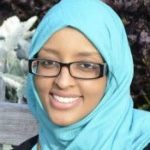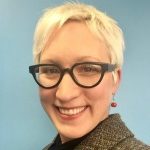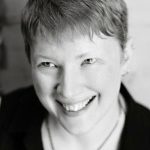
The 2017-19 cohort met with members of the Advisory Committee at their capstone on August 5.
After nearly two years of gathering together, the Collegeville Institute’s inaugural Multi-Religious Fellows cohort attended their final capstone meeting earlier this month. The meeting, which spanned Sunday, August 4 and Monday, August 5 at the Minnesota Humanities Center, brought several members of the Advisory Committee (including Ned Mohan, Bill McDonough, Hamdy El-Sawaf, Gary Reierson, Abdisalam Adam, Tom Duke, and Sosan Flynn) to meet the Fellows and hear brief summaries of their projects. The Fellows each received $1000 in seed money to plan and implement a leadership project for their religious community.
Fellows’ Projects

Aaron Weininger is participating in a multi-congregational initiative, Exploring Faith-Nurturing Relationships in Diverse Faith Communities, directed by the Search Institute. Participants come from across the country and faith traditions, and Aaron found this project through a connection he made with Kent Pekel, who came and spoke with the Fellows about educating youth in the 21st century.

Rabbi Jennifer Hartman is working with an increasing number of interfaith families in her congregation, Temple Israel. She is designing a multi-generation curriculum of religious education for these families in what it means to be Jewish, both religiously and culturally, with particular attention to blended rituals and holiday celebrations.

Claire Shea explored forms of faith formation for junior high school students which was “innovative yet practical” and aimed at engaging them in what she calls “conversational catechesis” in diverse, dynamic, and engaging ways. The formation took place in a seminar format at Benilde-St. Margaret. The two pilot courses were the basis for an article in America and will be the basis for a presentation at an international conference on Catholic Religious Education in Australia.

With her colleague in theater and performance at Augsburg University, Fardosa Hassan will be organizing a series of story circles for Muslim and Jewish students next year. They hope to gather stories, present them to the Augsburg community, then develop story circles for use in local faith communities.

Working from Islam’s injunction against usury, Tamim Saidi is setting up an organization that will fund people experiencing emergencies with interest-free loans for up to $1000. He raised conservable funds during Ramadan, when Muslims are particularly focused on charity. He’s also crowd-funded to augment the capacity of the loan society. Criteria for access are that people have a regular income and a demonstrated, urgent need.

Andrea Roske-Metcalf is completing a children’s bible that is historically accurate, and sensitive regarding issues of race, gender, status, and class. She aims to retell fifty stories from the Hebrew Bible, along with 50 from the Christian New Testament. She currently is 60-70% done with the writing and closing in on an illustrator.

Genjo Conway is designing anti-racist training for Buddhist communities, and he hopes to visit the Brooklyn Zen Center, the East Bay Meditation Center in Berkeley, and an LA Buddhist sangha to see how other communities engage antiracism.
 Daishin Smith has developed a sock-puppet training camp to teach empathy. She’s got the socks, she’s got the instructions – and she’s even got the certification. She hopes to do this in public places – farmers’ markets, libraries, etc. to help people talk across differences.
Daishin Smith has developed a sock-puppet training camp to teach empathy. She’s got the socks, she’s got the instructions – and she’s even got the certification. She hopes to do this in public places – farmers’ markets, libraries, etc. to help people talk across differences.

In early summer 2019, Joe Kruse organized a conference gathering Christian progressives in the hopes of creating a space for networking and strategizing how they should relate to their institutional bodies as well as the public square. These groups gathered from various Christian traditions in early summer, and Joe brought the schedule, a poetry companion from the retreat, even Fox 9’s television coverage of the group staging a peaceful protest outside another conference offering “recovery” from sexual orientation that group considered “improper.”
 Pooja Bastodkar and Neha Markanda from the MN Hindu Temple set up an organization that matches professional/business expertise in the Hindu community with needs in small business communities outside and around the community. Called DIGS, it draws on basic principles of Hindu philosophy: dharma, insaniyat, gnana, seva, all for the common good.
Pooja Bastodkar and Neha Markanda from the MN Hindu Temple set up an organization that matches professional/business expertise in the Hindu community with needs in small business communities outside and around the community. Called DIGS, it draws on basic principles of Hindu philosophy: dharma, insaniyat, gnana, seva, all for the common good.
Capstone Meeting
During the opening evening of the capstone meeting, the group heard from Don Ottenhoff, Executive Director of the Collegeville Institute, whose words opened the cohort’s first meeting when it gathered in Collegeville, MN in November, 2017. After giving background on the Founding Fathers’ vision for the role of religion in public, Don moved to elaborate the challenges he sees in the present moment: religious conflict, the privatization and marginalization of belief, the use of religion for political ends, and an idealization of religious institutions.
He identified two virtues that cross religious traditions and are sorely needed in the public realm today: participation or solidarity across traditions in the face of common challenges, and prudence or practical wisdom, which the ensuing discussion built out as the ability of religious leaders to find a “third path” among opposing factions. Fellows and members of the Advisory Council gave examples of situations where they gave witness, both within their communities and in the public realm.
“Don Ottenhoff identified two virtues that cross religious traditions and are sorely needed in the public realm today: participation or solidarity across traditions in the face of common challenges, and prudence or practical wisdom.”
On Monday morning, the Fellows heard from a final community presenter, Tim Welsh, Vice President of Consumer Banking at US BANK. Tim not only shared his personal vocational narrative, but also spoke at length about the work of The Itasca Project, which is one of many community initiatives to which he devotes time and leadership.

Tim Welsh addressed the Multi-Religious Fellows during their capstone meeting
Hearing about this highly regarded, nationally recognized Minnesota effort to harness the local business and non-profit community in behalf of vital civic needs was a fitting way to bring the two-year program to a close. Tim noted that the current emphasis of The Itasca Project is to build on the early childhood program that an earlier presenter, Dr. Art Rolnick, had explored with the Fellows. Working with the pioneering Northside Achievement Zone, Tim highlighted the profound impact that attention and intervention at an early age can have, both for participating children and their families, as well as for the community at large.
The rest of Monday’s sessions were given over to both oral and written evaluation, concluding with a closing ceremony. From their respective traditions, Fellows brought a blessing, object, or prayer as a way of commissioning their colleagues. They received sock puppets, a Hebrew blessing, a scroll inscribed with Buddhist koans, and a ceramic bird reminding Fellows to “consider the birds of the air.” The ceremony ended with promises to keep in touch, keep the faiths, and “be of good courage.”
From their respective traditions, Fellows brought a blessing, object, or prayer as a way of commissioning their colleagues.
Over these past two years, this cohort of exceptionally talented and vigorous young religious leaders has committed itself to learning from, and being challenged by, an outstanding range of community leaders. As the program concludes, the cohort’s leaders expressed confidence that the Fellows’ individual civic engagement projects, and their two-year involvement with each other, promise to enhance inter-religious relationships. Together, they will strive to shape stronger, more empowered communities committed to the common good.
* This report was co-authored by Barry Cytron and Marty Stortz
Like this post? Subscribe to have new posts sent to you by email the same day they are posted.



Leave a Reply